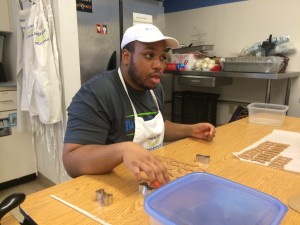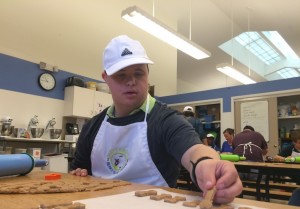Cierra Penson starts the week with her schedule planned out. Monday, she works at Publix. On Tuesday, she helps out at the Jacksonville Zoo. On Wednesdays, she'll join some classmates working on one of her school's business ventures: Barkin' Biscuits, a brand of dog treats now shipped around the country. The 19-going-on-20-year-old also juggles after-school guitar lessons, sessions with job coaches, and coursework aimed at teaching skills for adult life.

London Hurley works on Barkin' Biscuits, one of the in-house enterprises at the North Florida School of Special Education.
Sally Hazelip, the school's executive director, said teenagers and young adults with special needs "need to be as busy as we are." But holding down a full-time job can be stressful. So after students graduate — which for special needs students tends to happen between the ages of 18 and 23 — the school teaches skills, from time management to grocery shopping, that will help them thrive as adults.
In recent years, Florida lawmakers who saw the benefits of early-intervention programs and a proliferation of K-12 options for special-needs students began to focus on what would happen when those children got older. When the Legislature convenes this week, bills near the top of the agenda are aimed at expanding college and job opportunities for people with special needs.
The quest to help them achieve their potential doesn't end with a diploma. As Hazelip put it: "Our kids with special needs should have every opportunity that everyone else does."
Heather Penson-Holley, Cierra's mom, said that when she was younger, her daughter, who has epilepsy, sometimes suffered as many as 15 seizures a day. Each seizure would reset her memory, slowing her intellectual growth. When she started falling behind early in elementary school, Penson-Holley began searching for schools in the Jacksonville area that could meet her daughter's needs, and was repeatedly told they wouldn't be able to give her the help she needed.When Cierra was starting second grade, administrators at another private school pointed her to the North Florida School, which offered art and music programs, in-house therapies and six-to-one student-to-teacher ratio.
"She stayed for a day, and we knew this was where she wanted to be at that time," Penson-Holley said.
Over time, and amid numerous surgeries and treatments, she said her daughter became one of the busiest kids she knows. She participates in the annual River Run, competed in the Special Olympics, and took up soccer and basketball.
"I think the school gives them the confidence to know that the they can do whatever they put their mind to," she said — and that includes helping them set goals for later in life.
***
One morning last month, Ciaran Sontag was leading a music lesson.
He called out to a class of younger students, where Penson was visiting: "Music releases endorphins in your brain that make you feel good and give you..."The class finished in unison: "Energy!" Then everyone launched into a rendition of "Jingle Bell Rock."
Providing music and art classes, with other teachers in the room giving students extra attention, alongside the school's job-preparation and therapy programs, doesn't come cheap.
The school was started in 1992 by parents looking for new options for special needs students. As enrollment has grown to 110 (plus another 40 in its transition program), parents have come to rely on McKay scholarships to cover its $15,000-a-year tuition. A growing number — including Penson — use the state's newest educational choice program for special needs students, Personal Learning Scholarship Accounts. Step Up For Students, which hosts this blog, helps administer the accounts.
Without the scholarships, Hazelip said high-quality programs for special needs students would be impossible for most families to afford.
"This can happen because John McKay scholarships and PLSA happen," she said.

Joey Sacre lines up Barkin' Biscuits on a baking sheet while working the North Florida School of Special Education's kitchen.
The school is raising private money to support the plan. It also sought money in the state budget, later vetoed, which Hazelip said could help the school double its enrollment and serve as a model for special needs-focused schools around the state.
Walking through the campus, it becomes clear the students are used to adult visitors. In a model Hazelip calls "reverse inclusion," it also brings in students from other schools to work with its students.
"We're not only teaching kids with special needs," she said. "We're teaching anybody that walks through our doors."